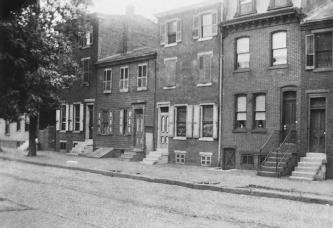3. Interleaf
From Walter to Walt
He is wisest who has the most caution,
He only wins who goes far enough.“Debris” (LG 1860, p. 421)
Some time after he had decided to become the Leaves of Grass poet, Whitman reminded himself, “I want something to offset the overlarge element of muscle in my poems—it must be counterpoised by something to show I can make perfect poems of the graceful, the sweet, the gentle, the tender—I must show perfect blood, the great heroic gentleman” (NUPM 1:386). Whitman's aspirations to gentility were admittedly cleverly disguised by his iconoclastic textual persona as “one of the roughs” in 1855, and still further screened by his bland, post–Civil War incarnation as the “good gray poet.” But his early desire to be and to be considered a gentleman—expressed in his fiction, in his journalism, and in his dandyish 1840s man-about-town persona, the latter captured in a memorably awkward photograph—never entirely disappeared.[1] During the “long foreground” that so fascinated Emerson, Whitman worked to fuse his contradictory self-imaginings into a broadly inclusive social role. Having in his own eyes “split the earth and the hard coal and rocks and the solid bed of the sea,” having gone down “to reconnoitre there a long time,” Whitman, ever the faithful journalist, brought back “a report” on what he had seen (NUPM 1:69), in which he described his struggle with naturalized traditions of language that split body from soul, men from women, men from men. Having seized, he dared to hope, the “passkey” to hearts (LG 1855, p. 130), and armed with this token of his struggle, Whitman determined to transform those others, including the “gentleman of perfect blood,” who normally resisted his advances.
Whitman, then, used poetry to create a comprehensive persona and to answer to his historically particular needs. The rough was not only a recognizable social type but a figure from within; so too was the bachelor gentleman, who surfaces briefly in the untitled 1855 poem later called “Song of the Answerer,” in response to the poet's desire to be loved and to receive the honor that is his due. Together, the democratic poet and the gentleman of perfect blood absorb those recalcitrant others who impede their progress toward happiness, an ill-defined but no less tantalizing goal.
| The gentleman of perfect blood acknowledges his perfect blood, | |
| The insulter, the prostitute, the angry person, the beggar, see themselves in the ways of him. … he strangely transmutes them, | |
| They are not vile any more. … they hardly know themselves they are so grown. |
(LG 1855, p. 131)
Although most criticism has ignored Whitman's perfect gentleman, preferring instead to focus on the rough as an exuberant manifestation of the poet's democratic ideology, the “gentleman” expresses Whitman's fastidious recoil from social outcasts and from his “vile” imagination of himself as one of them. Both the muscular New York rough and the sweet and tender gentleman are impervious to criticism: the rough because of his hypermasculine coarseness, the gentleman because of his class-based access to tradition. Both are armored as Whitman was not. Or rather, he wrote most movingly out of that part of himself that needed protection from the distant ironical echoes and indecipherable messages that already haunt the 1855 volume, littering it with debris.
“Apart from the pulling and hauling stands what I am,” the poet notes with a superb touch of aristocratic hauteur in Section 4 of “Song of Myself,”
| Stands amused, complacent, compassionating, idle, unitary, | |
| Looks down, is erect, or bends an arm on an impalpable certain rest, | |
| Looking with side-curved head curious what will come next, | |
| Both in and out of the game and watching and wondering at it. | |
| Backward I see in my own days where I sweated through fog with linguists and contenders, | |
| I have no mockings or arguments, I witness and wait. |
(LG, p. 32)
The rough fights anybody who gets in his way; the gentleman fights nobody, he doesn't need to. Evidently the perspective from above is the
Divergent and differently marked voices haunt the 1855 Leaves of Grass, as in some measure they continue to haunt subsequent books. Even as he strove for unity, consecutiveness, ensemble, Whitman mainly produced a poetry of disunion, gaps, and indirection. Despite the generosity and amplitude of his vision, few of the poems of the first three editions were psychologically complete, and Whitman looked to readers to complete the task that he himself had only begun. Although “launched from the fires of [him]self,” “too personal,” and “too emotional” (Corr 3:307), the Leaves of Grass project was grounded in “unconscious, or mostly unconscious intentions,” as the poet himself freely acknowledged (LG, p. 562).
Drawing on the fierce energies of his discontents, the poet who sought to deflect criticism by writing his own self-reviews both entered into and withdrew from the American literary scene in 1855; its battles were his and not his, just as his book was both published and privately printed; it was commercially distributed by Fowlers and Wells, yet he paid for its publication himself. Despite his intense fear of criticism and failure, Whitman tried to recount his emotional battles to an audience he might trust even as he sought to defend himself against predictably hostile, skeptical, or indifferent responses to his literary ambitions, whether they were muscular, graceful, sweet, gentle, tender, heroic, or bloody. As he explained mock-humorously in “Song of Myself,” “To touch my person to some one else's is about as much as I can stand” (LG 1855, p. 53), a statement that captures perfectly both the intensity of his desire to be loved and the suspiciousness of his intellectual stance. Though famously singing the body electric, he thoroughly distrusted those “instant conductors” which alerted him to his own tactile vulnerability, finding it difficult to imagine that in seizing “every [erotic] object” he might lead it “harmlessly” through himself. Objects needed to be neutralized, as did people. And people needed to be objectified, to be transformed into characteristic and harmless types.
This ability to read people (including himself) as types apparently deserted
| O baffled, balk'd, bent to the very earth, | |
| Oppress'd with myself that I have dared to open my mouth, | |
| Aware now that amid all that blab whose echoes recoil upon me I have not once had the least idea who or what I am, | |
| But that before all my arrogant poems the real Me stands yet untouch'd, untold, altogether unreach'd, | |
| Withdrawn far, mocking me with mock-congratulatory signs and bows, | |
| With peals of distant ironical laughter at every word I have written, | |
| Pointing in silence to these songs, and then to the sand beneath. |
Following this appealingly agitated passage, the poet casts about for redemption which, to say the least, does not come quickly or easily. After an unsatisfactory encounter with a silently rejecting father, he turns in desperation to a mother so caught up in her own troubles that she has no time for him: a “fierce old mother … hoarse and angry,” bemoaning her losses, the “castaways” of her dead dreams. Out of this emotional and rhetorical impasse Whitman writes bitterly to his fierce and tender muse, “We, capricious, brought hither we know not whence, spread out before you, / You up there walking or sitting, / Whoever you are, / We too lie in drifts at your feet” (LG, pp. 254, 256). Self-convicted for his arrogance, on which almost all the early reviewers remarked, the self-estranged Whitman of “As I Ebb'd” did not boast of the contrary contractile impulse which he expressed through such figures as the hermit thrush in “When Lilacs Last in the Dooryard Bloom'd,” the “shy and hidden bird … withdrawn to himself, avoiding the settlements,” who “Sings by himself a song” (LG, p. 330).
For the Whitman of the 1855 Leaves of Grass, who was not only recording his experience but creating it, the expression of sexual desire could precipitate physical and emotional crises whose outcome was desperately uncertain. “You villain touch!” the speaker exclaims operatically about midway through “Song of Myself,” “what are you doing?. … my breath is tight in its throat; / Unclench your floodgates! you are too much for me” (LG 1855, p. 54). Contextually free-floating even as the speaker is pinned down, “touch” is responsible for those fitful acts of aggression by which Whitman's speaker is brutally and irrationally possessed. Such initially destructive but (he hopes) ultimately creative losses of self-possession invade the hero's gendered self-consciousness; they strain the udder of his ungendered heart for its withheld drip, whether
In the first three editions of Leaves of Grass, Whitman sought to make a virtue of the “roughness” that he distrusted in himself and in his society. Embracing the social violence and psychological vulnerability that he could not extirpate, he folded these fateful forces into a larger rhetorical scheme. Balancing muscle with tenderness, invoking not only the genital “meat of a man or woman” but also “the meal pleasantly set,” “the meat and drink for natural hunger,” this orally aggressive poet masked the “occult convolutions” of his brain with blandnesses, such as the soothing thought that “All truths wait in all things” (LG 1855, pp. 54, 42, 49, 54). Yet this same self-disguising and deeply divided poet also asserted that “Logic and sermons never convince, / The damp of the night drives deeper into my soul” (LG 1855, p. 54). Thus Whitman created his own organic logic and endorsed a daring doctrine of sexual candor, despite the formidable codes of rhetorical and emotional caution to which he also resorted. The risk-taking sexual persona was born out of roughnesses inflicted on and internalized by the man. The fitful identification with “Blind loving wrestling touch! Sheathed hooded sharptoothed touch!” (LG 1855, p. 54) was genuine, but so too were the “occult convolutions” of a calculating, highly disciplined emotional intelligence which sought out unequal power relations in the erotic sphere. Making textual sex emerged as Whitman's solution to psychological, social, and political dilemmas he could not resolve in life. As Richard Rorty remarks, “Whitman wanted the struggle for social justice to be the country's animating principle, the nation's soul.”[2] But what if he could not exemplify this struggle in his own innermost person? What if his “blood” was not “perfect”?
During the 1830s, 1840s, and 1850s, the Whitman who distrusted the privacy of the bedroom lived much of his dream life, which he folded into his professional life as a writer, in urban public places.[3] Our premier walker in the city, he browsed storefronts and bookstores and art galleries and concert halls and phrenological cabinets and Crystal Palaces; he famously loved operas and plays and photographic exhibits; he responded passionately to the faces in the Manhattan crowds as they
“No one could see him sitting by the bedside of a suffering stage driver without soon learning that he had a sincere and profound sympathy for this order of men,” recalled the distinguished eye surgeon Dr. D. B. St. John Roosa, who had known Whitman in the late fifties when he was a young member of the House Staff of the old New York Hospital on Broadway. Roosa also observed Whitman in more relaxed settings. Accompanied by other physicians, they went to Pfaff's “rather famous cellar restaurant” in the afternoons and shared lager beer and “Schweitzer kase, schwartz brod, Frankfurter wurst, and even sauerkraut,” at a time when these ordinary German foods were still exotic entries on the North American table. Yet despite this gemütlich atmosphere of male camaraderie, much of it occurring in the house doctor's combined bedroom and office, its walls ornamented with an 1855 Leaves of Grass self-portrait donated by Whitman, Roosa recalled that “he seemed to live above the ordinary affairs of life. I do not remember—and I saw him at least fifty times—ever having heard him laugh aloud, although he smiled with benignancy.
He was not interested in the news of everyday life—the murders and accidents and political convulsions—but he was interested in strong types of human character. We young men had not had experience enough to understand this kind of a man. It seems to me now that we looked at Whitman simply as a kind of crank, if the word had then been invented. His talk to us was chiefly of books, and the men who wrote them—especially of poetry, and what he considered poetry. He never said much of the class whom he visited in our wards, after he had satisfied himself of the nature of the injury and of the prospect of recovery. He gave me a copy of “Leaves of Grass,” and he was apparently very proud of his achievements in verse. I must confess that I did not understand them then, any more than I understood the character of the man who wrote them. (NUPM 2:527–28)
Like his character Langton in “The Child and the Profligate,” who had turned aside from a vaguely defined career in medicine, and like the psychiatrist friend of his later years, Richard Maurice Bucke, Whitman needed to feel needed. But what kind of sexual life emerged from his emblematic interactions with vigorously virile Broadway stage drivers, with these same young men humbled into working-class patienthood, and with the more privileged male physicians whose combined office and bedroom was “the hiding place of many a secret, and the source of no inconsiderable brief authority” (NUPM 2:527)? The 1855 “Preface” had noted that “The old red blood and stainless gentility of great poets will be proved by their unconstraint” and that “A heroic person walks at his ease through and out of that custom or precedent or authority that suits him not” (LG 1855, p. 13), but unconstraint did not come easily to Whitman. He was too aware of the “cruel inferiorities” of American life to abandon himself outside of literature to the class-defying, male-homoerotic orgies of which he dreamed. So while the American bard was no “irresolute or suspicious lover,” Whitman appears to have been just that (LG 1855, p. 11). Before the Civil War, he lived most of his sexual life (to the extent that it was not primarily autoerotic) as a man of the crowd, drawing on the energies of the modern city and using “the energy of his sexuality to formulate a utopian image of social harmony.”[4] Whitman identified with young, working-class men such as the drivers he visited in New York Hospital because they exemplified the cruelty and threatened social death he himself feared, and the pain of representational exclusion permeates the 1855 Leaves of Grass. Whitman dramatized
In 1855, Whitman spoke boldly of his own sexual confusion in a number of the most radically innovative sections of his book-in-process, such as the famous “villain touch!” passage discussed above. And he returned obsessively to the reassuringly common pleasures of the body, of which he could not get enough. Even when sexually marked as male, or female, or both, the body-in-process became his symbol of democratic community, and of our humanly undifferentiated, all-too-common fear of death. Whitman hoped that his body-worship would enable him to penetrate his neighbor's otherwise incomprehensible dress and dreams, and in some measure to descend into the chaos of his own (DBN 3:765–66). Embracing the double-life magnetisms of day and night, the poet explored both his need for relational self-definition and his need to flee from the limitations of the flesh into the freer languages of fantastic mélanges. These two projects were not mutually exclusive, since Whitman knew almost too well that relationships may be mainly fantasy, and that freedom and limitation were not easily differentiated from each other. Despite his claims to know the meaning of freedom, sexual freedom in particular remained difficult to specify.
Considering his neighbor's dreams, Whitman understood them from different vantage points. Though fundamental, sexuality was read in and through other categories of subjectivity, such as race and education and age and athleticism and beauty and social class. In his apostrophe to touch, for example, Whitman draws on various vocabularies to suggest that he is many people flooded with multiple sensations: burning, etherized, electrified, scalped, suffocated, and so on. Given the productive violence of such multiplicity, ordinary language categories which ask us to distinguish between various forms of sexual experience are revealed as ineffective. Whitman writes those new words which are still not in any book. In his own terms, as he explained in his 1856 open letter to Emerson, he was “wording the future” (LG, p. 740).
To say this is not to deny that Whitman was ambivalent as well as occasionally complacent about resolving the very real contradictions of feeling and principle which informed his life and his texts. He believed that the personal was political, but his project was not truly argumentative and dialectical, as Rorty contends, since he was constantly defining the boundaries of the personal. The self as Whitman understood it was
| This is the city. … and I am one of the citizens, | |
| Whatever interests the rest interests me. … politics, churches, newspapers, schools, | |
| Benevolent societies, improvements, banks, tariffs, steamships, factories, markets, | |
| Stocks and stores and real estate and personal estate. |
(LG 1855, pp. 73–74)
Whitman does not really represent himself as a political poet fearing the impending threat of national disunion. Rather, he portrays himself as an amiable gawker who delights in the haphazard material and social abundance of an urbanized landscape to which he thoroughly belongs, owning both the reassuring transparency of the place and of himself. This is the spectatorial Whitman who cruises store windows during his 1860 visit to Boston, noting “fine stores on Wash st. (Jones, Ball & Co Rich Ornamental goods & Jewelry (Williams & Everitts, Pictures & Rich engravings),” finding on Washington Street fine trees and hot air furnaces and “Wentworth & Bright Carpets / John Collamore China &c also the adj building on the corner / iron front building of Parker, Towle & Sons Corner of Wash also iron front building Am Tract Society toward foot of Washn st / Oliver Brewster's cor State st gray granite / Codman Buildings gray granite / Wash st Warren & Co Chickering, pianos very good” (NUPM 1:426, 424–25). This noncontroversial Whitman might have
Of course, there were more serious issues that commanded his attention in Boston in 1860, a Boston which was like, yet different from New York. “BLACKS,” he wrote, in a passage filled with extraordinary modulations of tone,
You see not near as many black persons in Boston, as you would probably expect; they are not near as plenty as in New York or Philadelphia. Their status here, however, is at once seen to be different. I have seen one working at case in a printing office, (Boston Stereotype Foundry, Spring lane,)—and no distinction made between him and the white compositors. Another I noticed, (and I never saw a blacker or woolier African,) an employee in the State House, apparently a clerk or underofficial of some such kind. At the eating-houses, a black, when he wants his dinner, comes in and takes a vacant seat wherever he finds one—and nobody minds it. I notice that the mechanics and young men do not mind all this, either. As for me, I am too much a citizen of the world to have the least compunction about it. Then the blacks here are certainly of a superior order—there is a black lawyer, named Anderson (a resident of Chelsea) practising here in Boston, quite smart and just as big as the best of them. / and in Worcester, they are now put on the jury list, two of the names put on being black men, one of them a fugitive slave who has purchased his freedom. (NUPM 1:422–23)
Whitman encompasses all these voices, which also correspond, I am suggesting, to various sexual attitudes: naive, sophisticated, eager, indifferent. “No one will perfectly enjoy me who has not some of my own rudeness, sensuality and hauteur,” he remarked in another one of those notebook entries which survived his 1874 bonfire (the first of several) and which sound as though they were written with an eye to being read (NUPM 3:380). But how are these three terms related? Is to be rude to be sensual and arrogant? Or does the finer politeness, the greater heroism and moral elegance, consist precisely in the willingness to sacrifice conventional models of social consideration to a higher duty which consists in acknowledging one's own roughness? To what extent can the great heroic gentleman violate codes of conduct that the ordinary gentleman respects?
Wrestling with these issues in the publicity he generated for the 1855 Leaves of Grass, Whitman approached them both directly and indirectly.
loves the docks—loves the free rasping talk of men—likes to be called by his given name, and nobody at all need Mr. him—can laugh with laughers—likes the ungenteel ways of laborers—is not prejudiced one mite against the Irish—talks readily with them—talks readily with niggers—does not make a stand on being a gentleman, nor on learning or manners—eats cheap fare, likes the strong flavored coffee of the coffee-stands in the market, at sunrise—likes a supper of oysters fresh from the oystersmack—likes to make one at the crowded table among sailors and work-people—would leave a select soiree of elegant people any time to go with tumultuous men, roughs, receive their caresses and welcome, listen to their noise, oaths, smut, fluency, laughter, repartee—and can preserve his presence perfectly among these, and the like of these. (CH 46)
Although there is no persuasive evidence that a working-class male lover or a series of such lovers transformed the class conscious Walter of the fiction, the journalism, and the dandyish 1840s man-about-town photograph into the democratic Walt of the 1855 Leaves of Grass—and I am arguing that this progressive transformation was never completed—Whitman certainly used poetry to reduce the conflict between his utopian imagination of the sexually open road and his dystopian experience, as a bachelor-intellectual, of a sexually confining literary tradition that privileged white, heterosexual, middle-class norms. Whether or not Whitman's sexual experience during his twenties and thirties was a combination of autoeroticism and casual homoeroticism—and there is reason to think that it was—during the period 1848–55, as his life-circumstances became more than ordinarily fixed—fixed, that is, in relation
Conscious that the full flush of youth had now passed him by and that he was unlikely ever to perpetuate himself except through language—no biological children for him—the Whitman who, so far as we can tell, never committed himself to an extended relationship with a male lover during the 1850s committed himself instead to sustaining his quarrel with oblivion. Whether or not he was to command a sufficiently responsive audience during his lifetime, “One world is aware, and by far the largest to me, and that is myself,” he explained confidingly in “Song of Myself,”
| And whether I come to my own today or in ten thousand or ten million years, | |
| I can cheerfully take it now, or with equal cheerfulness I can wait. | |
| My foothold is tenoned and mortised in granite, | |
| I laugh at what you call dissolution, | |
| And I know the amplitude of time. |
(LG 1855, p. 44)
As an artist-survivor intermittently buoyed up by his faith in a deferred or even posthumous audience, Whitman reveled in his freedom from the seminal conventions of poetic time as it had traditionally been expended. And the outrageous humor which had been singularly missing in his fiction and journalism bubbled up from the float now. No deadlines, he proclaimed. NO DEAD LINES. No man nor woman shall see the end. As writing became a form of erotic roving, he hoped that his words would endure like granite. And he could cheerfully compare his seemingly effortless craft to the family business, the builder's trade. His faith in some enduringly responsive erotic community, he seemed to be saying, was graved in adamant. Refusing to be snuffed out by his father, or like him, “I know this orbit of mine cannot be swept by a carpenter's compass,” he wrote. “I know I shall not pass like a child's carlacue [curlicue] cut with a burnt stick at night.” Experiencing himself as threatened, perhaps castrated, he also experienced himself as “august” (LG 1855, p. 44). Most modern individuals, he felt, were beset by comparable “natural” contradictions.
By 1854, then, Whitman was discovering a new solution to his sexual, gender, and class anxieties along the following lines. He would himself
Following his return from New Orleans in 1848, political events he could not control caused Whitman the reform journalist to view himself as professionally marginalized. He spent part of the summer relaxing on the beach, but he was also elected as one of fifteen delegates representing Kings County at the convention which formed the Free-Soil Party in Buffalo in early August. Living in the deep South had strengthened Whitman's antagonism to the spread of slavery, even if, as we have seen, it had not purged his vocabulary of the word “nigger.” By September 9, 1848, he had published the first issue of the Weekly Freeman. That night, fire struck and his office was destroyed. Undaunted, he resumed publication by November 1 and was able to convert the paper into a successful daily in the spring of 1849. When the so-called “Barnburners,” the radical
After the present date, I withdraw entirely from the Brooklyn Daily Freeman. To those who have been my friends, I take occasion to proffer the warmest thanks of a grateful heart. My enemies—and old hunkers generally—I disdain and defy just the same as ever.[8]
Called the “Abdiel of his party” by the Brooklyn Star, Whitman was taunted as “a very crying child” by the Eagle, which noted that “Like Oliver Twist, he was always asking for ‘more.’”[9]
Although he continued to engage sporadically in freelance journalism and held at least one other short-lived editorial post, Whitman was becoming thoroughly disenchanted with the scurrilous attacks to which he was subjected as a political journalist, as well as increasingly frustrated by the dependency of his profession on the whims of others.[10] Poetry was beginning to seem to him the more radical and uncontaminated medium.[11] Meanwhile, on the personal front he had already begun to act out the reparenting comedy he was later to write, admittedly on a larger and more fantastic scale. His hair had turned prematurely gray, he considered his siblings “My Boys and Girls,”[12] he was ardently attached to his younger brother Jeff, whom he had taken with him to New Orleans, and he was looking for ways to transform himself from Walter to Walt. Walter, his father's name, suggested a certain woodenness, tension, and reserve. The comradely Walt hinted at relaxation and a continuous, self-inscribed present. “Likes to be called by his given name, and nobody at all need Mr. him,” he had written in the Brooklyn Daily Times review. “Can laugh with laughers.”
At what point, then, did Walter become Walt? What caused him, like so many other male writers of the American Renaissance—Emerson, Thoreau, Hawthorne, Melville, Poe, Douglass—to alter his name? Richard Maurice Bucke's 1883 biography, which was partially written by the poet himself, addresses this issue in an early footnote: “At home, through infancy and boyhood, he was called ‘Walt,’ to distinguish him from his father ‘Walter,’ and the short name has always been used for him by his relatives and friends.”[13] Whether or not Whitman was the source of this note, in some sense he approved of its publication. At the
You need not be alarmed about the yellow fever as that gentleman will (the folks think) not visit this place this summer. The reason they give for that is this. It does not come but once in three or four years, and last season it was very hard and killed a great many persons (I mean it does not come but once in three or four years in such a shape). Besides it is a great humbug, most every one in our office has had (some of them have had it twice) and got well. It is caused mostly (I think all of it) by the habits of the people, they never meet a friend but you have to go drink and such loose habits.
You know that Walter [emphasis added] is averse to such habits, so you need not be afraid of our taking it. (Corr 1:31)
Whitman himself signed all his pre–Leaves of Grass correspondence either with his initials or as Walter. And Helen Price, who knew the family beginning in 1857, remarked that she never heard his mother call him Walt. To her, he was always Walter.[14] By 1860, however, his mother had begun to call him Walt in her letters, while also continuing to address him, often within the same letter, as Walter.[15] Thus, despite the possibility that the Whitmans operated at two levels, oral and written, or that his mother began to call him Walter only after his father's death in July 1855, it seems highly unlikely that Whitman was consistently called Walt during his childhood to distinguish him from his father. In short, there is no known use of the name “Walt” before its appearance in the first Leaves of Grass,[16] where it figures in Section 24 of “Song of Myself” as textual proof of Whitman's erotic availability. Describing himself as a revolutionary poet who “make[s] short account of neuters and geldings, and favor[s] men and women fully equipped, / And beat[s] the gong of revolt, and stop[s] with fugitives and them that plot and conspire,” Whitman further names himself as
| Walt Whitman, an American, one of the roughs, a kosmos, | |
| Disorderly fleshy and sensual. … eating drinking and breeding, | |
| No sentimentalist. … no stander above men and women or apart from them. … no more modest than immodest. |
(LG 1855, pp. 47–48)
Hypervirile. No sentimentalist. No sissy. Breeding negations which are also affirmations. But of what? And what kind of drinking is he talking about? Is this the kind of drinking in which Franklin Evans engaged after meeting his friend Colby in New York City?
“But come,” said he, “this is dull fun here. Let us go out and cruise a little, and see what there is going on.”
“Agreed,” said I. “I shall like it of all things.” So we took our hats and sallied forth from the house. (EPF 152)
Turning, however, to the letters written to Walt by his brother Jeff during the post–Leaves of Grass years, we discover another pattern. “Dear Brother Walt,” he writes from Jamaica, New York, on April 3, 1860, signing the letter “Your affectionate Brother Jeff.”[17] Though Jeff occasionally varies his own signature, Walt is invariably Walt. Thus it seems likely that Walt was called Walt by his siblings before 1855, but not invariably. And not by his parents. During his father's lifetime, Whitman was content to publish his work as Walter Whitman, though he occasionally used a pseudonym such as “Paumanok” or “J. R. S.” (Later, he was to use such pseudonyms as Velsor Brush, Mose Velsor, and George Selwyn.) Whitman cannot, however, have been called Walt rather than Walter by his siblings to differentiate him from his father, since his siblings were not in the habit of referring to their father as Walter. On the eve of his father's death, as the outsetting American bard, he renamed himself in such a way as to perpetuate a personal past while signaling his newfound freedom from it. America, we recall,
does not repel the past or what it has produced under its forms or amid other politics or the idea of castes or the old religions. … accepts the lesson with calmness. … is not so impatient as has been supposed that the slough still sticks to opinions and manners and literature while the life which served its requirements has passed into the new life of the new forms. … perceives that the corpse is slowly borne from the eating and sleeping rooms of the house … perceives that it waits a little while in the door … that it was fittest for its days … that its action has descended to the stalwart and wellshaped heir who approaches … and that he shall be fittest for his days. (LG 1855, p. 5)
The erotic experiences in Whitman's life between 1848 and 1854 that enabled him to conceive his visionary Walt persona remain obscure and warrant further investigation. Certainly, as Walt he writes like a man relieved of a tremendous burden, though there is always the sense that the depressions which were a paternal family legacy and by which he had previously been threatened might recur.[18] Hysteria looms on the horizon. To stabilize his newly acquired emotional poise and intellectual aplomb, Whitman creates a survivor's narrative within “Song of Myself” that potentially links him to his audience. He also remains uncertain
| You will hardly know who I am or what I mean, | |
| But I shall be good health to you nevertheless, | |
| And filter and fibre your blood. | |
| Failing to fetch me at first keep encouraged, | |
| Missing me one place search another, | |
| I stop some where waiting for you |
(LG 1855, p. 86)[19]
Scholars have debated whether the lack of terminal punctuation (the period reappears in 1856) was intentional.[20] But there is a certain poetic justice in its absence within a poem that resists the full burden of traditional modes of closure—as Whitman himself, throughout the rest of his life in poetry, was to do.
Whitman's letters during these years 1848–54 are both few in number (seven if the count is generous) and comparatively uninformative. Consider, for example, a letter from New Orleans to his mother. Dated “Tuesday morning, 28th March” [1848], it is concerned with money, health, and silence. There is also a pastoral idyll of the sort that Whitman and his mother entertained between themselves virtually to the end of her life. He mentions a farm, but who would work this farm? Surely not Whitman and surely not his father, who is already erased from the text.
Dearest Mother;
In one of my late letters, I told Hannah [his sister, then living at home] that if you did not receive money, by a letter from me, to pay the interest on the 1st of May, she must go down to the bank and draw $31 1/2, and pay it at the insurance office, and get a receipt for it. However, I may send money in a letter before that time—or part of it. O, mother, how glad I was to hear that you are quite well, again. Do try to keep so; you must not work—and they must all be kind to you. If you only keep well till I get home again, I think I shall be satisfied. I began to feel very uneasy, not hearing from you so long. My prospects in the money line are bright. O how I long for the day when we can have our quiet little farm, and be together again—and have Mary [his other sister] and her children come to pay us long visits. I wrote to Mary yesterday.
W. W. (Corr 1:33)
If there was a New Orleans romance, Whitman's mother would not have been one of the first to know. And if Jeff, the fourteen-year-old brother who accompanied Walt, knew, he never told—either in these letters
Turning to the next letter in Whitman's preserved correspondence, we discover a brief note of April 24, again to his mother. From New Orleans, Jeff was the expansive letter writer. “Dear mother,” Walter Whitman wrote,
I shall write to you myself in a few days. O how I long to see you. Hannah must get $31 1/2 from the Bank to pay the interest. If she just asks for Mr. Hegeman [a bookkeeper in the Atlantic Bank] and tells him she is my sister, he will show her every accommodation. (Corr 1:36)
The next letter is dated “Brooklyn, Jan. 15, '49,” and addressed to Tunis G. Bergen, an official of the Brooklyn city treasury. Whitman, who was an editor-printer at the time, explained, “It would be a great obligation to me, if you would present the enclosed bill and start it on its passage, so that I could get my pay as quickly as possible. For, like most printers, I am horribly in need of cash. Do, my dear sir, oblige me, in this matter, if possible” (Corr 1:37).
Before 1855, there are four remaining letters, none of them dated after August 1852. The first, written in June 1850, offers to serialize and to condense a Danish historical novel, The Childhood of King Erik Menved, an offer that was not accepted (Corr 5:282–83).[23] The second, to Carlos D. Stuart, and dated October of about 1850, was, in effect, a job application (Corr 1:38). Stuart was the editor of a New York daily. So far as is known, nothing came of Whitman's request for work, though his ideas for salary were “very moderate.” The third, to W. M. Muchmore, a dealer in coal and wood in Brooklyn, was a request that Much-more, “if convenient,” remind Tunis G. Bergen of Whitman's unpaid bill for advertising ($50) (Corr 1:38–39). The last of these pre–Leaves of Grass letters, dated August 14, 1852, was addressed to Senator John Parker Hale of New Hampshire, Free-Soil candidate for president.
With that extraordinary lack of tact he could exhibit when attempting to curry favor with powerful men (he was not a good flatterer), Whitman concluded,
How little you at Washington—you Senatorial and Executive dignitaries—know of us, after all. How little you realize that the souls of the people ever leap and swell to any thing like a great liberal thought or principle, uttered by any well-known personage—and how deeply they love the man that promulges such principles with candor and power. It is wonderful in your keen search and rivalry for popular favor, that hardly any one discovers this direct and palpable road there. (Corr 1:40)
Here is the same movement one observes in Whitman's 1856 open letter to Emerson: from compliment (“You must not only not decline the nomination of the Democracy at Pittsburgh, but you must accept it gracefully and cordially”) to more or less veiled insult.[24] Speaking for “the young men of our land—the ardent, and generous hearts,” Whitman wrote as though he were angling for a position in Hale's administration, perhaps as a reward for writing a campaign biography. Given the low probability that Hale would engage Whitman to write such a biography—as the successful Democratic candidate Franklin Pierce did with his longtime friend and Bowdoin College classmate Nathaniel Hawthorne—the letter is primarily altruistic along bossy, self-expressive lines:
O, my dear sir, I only wish you could know the sentiments of respect and personal good will toward yourself, with which, upon seeing a telegraphic item in one of this morning's papers, that you would probably decline, I forthwith sat down, and have written my thoughts and advice. I shall make no apology; for if sentiments and opinions out of the great mass of the common people are of no use to the legislators, then our government is a sad blunder indeed. (Corr 1:40)
Yet altruism competes with arrogance, which in the end wins. Republican idealism is ousted by Whitman's need to scold.
Taken together, these letters do not provide much, if any, insight into Whitman's putative awakening to love—with the possible exception of the first letter written to his mother, which underscores his long-standing devotion to her and her continuing dependence on him. Nor are Whitman's notebooks much help here. There are the “Young America” political statements,[25] the religio-philosophical statements, the observations on language. And there are the apparently random jottings that suggest Whitman's abiding interest in passing strangers, most of them men. But on the whole, there is less evidence of a transformative romance than we have for a nominally reclusive writer such as Dickinson,
To Horace Traubel, however, Whitman alluded guardedly and in passing to “one sparkling fellow in particular I fancied,” whom he met at the Brooklyn studio of the sculptor Henry Kirke Brown, probably in 1850. “They were big, strong days—our young days—days of preparation: the gathering of the forces,” he told Traubel. The memory of those times still excited him. “I fell in with Brown, the sculptor,” Whitman remarked,
was often in his studio, where he was always modelling something—always at work. There many bright fellows came … there we all met on the freest terms. I have been in contact with the Longfellow circles,[27] but they were literary, polite: I was not their kind—was not au fait—so preferred not to push myself in, or, if in, to stay in. The Brown habitues were more to my taste. There I would meet all sorts—young fellows from abroad stopped here in their swoopings: they would tell us of students, studios, the teachers, they had just left in Paris, Rome, Florence: one sparkling fellow in particular I fancied: he spoke of Beranger—I was greatly interested; he either knew Beranger or knew a heap about him. In this crowd I was myself called Beranger: my hair had already commenced to turn gray. (WWWC 2:502)
Surrounded by artists whom Whitman later identified, albeit indirectly, with “Greek” customs (he was to associate the celebrated sculptor John Quincy Adams Ward with John Addington Symonds, for example), Whitman became, for the first time, a member of a sophisticated cultural coterie.[28] As “Beranger,” he was likened to “the French Poet of Freedom,” the lyricist identified, as Whitman was to be, with radical social causes.[29] If in describing this scene to Traubel—and he recalled it with pleasure almost forty years later—Whitman was hinting at the vitality of New York's male-homoeroticsubculture in the early 1850s, he was recreating a milieu about which remarkably little is known, even today. The “one sparkling fellow in particular” he fancied disappears into the crowd. Under these circumstances, the social complexity of their relationship is virtually irrecoverable. So not only is there no dark lady to explain Whitman's development during this period, but we cannot attend closely to the development of his particular romantic friendships. Meeting him after the Civil War, Edward Carpenter commented on the “tragic element in [Whitman's] nature” which “possibly prevented him ever being quite what is called ‘happy in love affairs.’” Carpenter further noted, “He celebrates in his poems the fluid, all-solvent disposition, but often was himself less the river than the rock. In these moods, fixed, silent, and unquestionable, he was a thing you might try your strength upon, but
In any event, Whitman was writing a good deal of art criticism in the early 1850s, and the Brown circle invited him to address the first awards ceremony of the short-lived Brooklyn Art Union on March 31, 1851.[31] For a variety of reasons, the speech marks an important phase in Whitman's esthetic development. Describing the artist as a freedom fighter and arguing that “all men contain something of the artist in them,” Whitman began by attacking the low repute in which the true artist is held, “among such a people as the Americans, viewing most things with an eye for pecuniary profit.” Given the hostile cultural situation in which the American artist finds himself, the true artist must look to Eastern and especially to Greek sources for his inspiration.
Nay, may not death itself, through the prevalence of a more artistic feeling among the people, be shorn of many of its frightful and ghastly features? In the temple of the Greeks, Death and his brother Sleep, were depicted as beautiful youths reposing in the arms of Night. At other times Death was represented as a graceful form, with calm but drooping eyes, his feet crossed and his arms leaning on an inverted torch. Such were the soothing and solemnly placed influences which true art, identical with a perception of the beauty that there is in all the ordinations as well as all the works of Nature, cast over the last fearful thrill of those olden days. Was it not better so? Or is it better to have before us the idea of our dissolution, typified by the spectral horror upon the pale horse, by a grinning skeleton or a mouldering skull? (UPP 1:243–44)
However impulsive and ideologically unmarked Whitman's erotic experiments had been heretofore, by 1851 he was moving intuitively toward an affirmation of “Greek” values as the basis of a redeemed community. “The beautiful artist principle sanctifies that community which is pervaded by it,” he explained. “A halo surrounds forever that nation.—”
There have been nations more warlike than the Greeks. Germany has been and is more intellectual. Inventions, physical comforts, wealth and enterprize are prodigiously greater in all civilized nations now than they were among the countrymen of Alcibiades and Plato. But never was there such an artistic race.
At some later time, perhaps in the 1860s, Whitman noted, after reading the Bohn edition of Plato,
Phaedrus (Plato) purports to be a dialogue between Socrates & Phaedrus—the latter a young man, who, coming to Socrates, is full of a discourse by Lysias on Love—he reads it to S.—who finally proceeds to give a discourse on
The carefully elaborated, officially sanctioned institutionalization of homosexuality which existed in classical Greece might well have astonished Whitman in the 1860s. But in 1851, the extent to which Whitman's references to Greek culture constitute deliberately coded references to male-homoerotic practices is difficult to determine.[32] As previously noted, he appears to have been moving somewhat haphazardly toward the creation of a homosexual discourse which would eventually be unerringly acknowledged by many others, whatever his own prudential blindness.[33]
Speaking in Brooklyn not necessarily as a member of a sexual subculture but unmistakably as a seeker after moral beauty in a money-driven culture, Whitman ironically likened himself and other unknown artists to “an ample palace of surpassingly graceful architecture, filled with luxuries and gorgeously embellished with fair pictures and sculpture,” standing “cold and still and vacant.” Artists, he asserted, often failed to appreciate their own worth. As an alternative to self-pity, he prescribed a sacred duty to “go forth into all the world and preach the gospel of beauty” (UPP 1:242–43). Yet Whitman remained troubled by this vision of himself as an empty palace, never to be known and enjoyed by its rightful owner. It proved to be a haunting fantasy of neglect, privatization, and feminization, inscribing an identity Whitman was consciously determined to suppress.
In an early notebook entry, which served as the basis of his long, unpublished free-verse poem “Pictures,” Whitman further developed his expanding conception of himself as a man of the people. “Who is this,” he asked himself theatrically, “with rapid feet, curious, gay—going up and down Mannahatta, through the streets, along the shores, working his way through the crowds, observant and singing?” (NUPM 4:1299). The “Pictures” notebook adumbrates “Song of Myself” in its presentation of an imagination unbounded by space and time, yet strangely literalized within the body of a single individual, himself. Whitman eventually dropped the cumbersome head-as-art-gallery metaphor that controls his notebook draft. But he was more persistent in furnishing himself with lovers who were alternative, cross-class personae:
| And there hang, side by side, certain close comrades of mine—a Broadway stage-driver, a lumberman of Maine, and a deck-hand of a Mississippi steamboat; | |
| And again the young man of Mannahatta, the celebrated rough, | |
| (The one I love well—let others sing whom they may—him I sing, for a thousand years!) |
(NUPM 4:1303–4)[34]
Describing himself as “The phallic choice of America” who “leaves the finesse of cities” and all the “achievements of literature and art” to “enjoy the breeding of full-sized men, or one full-sized man or woman, unconquerable and simple,” Whitman rounded out his portrait of “inimitable pictures.” Materials that might have provided the basis for despair were in the process of being transmuted into a more hopeful narrative. Although Whitman's association of the “artist race” with his own feminization was to persist, he was all the more determined to slake “the unquenchable thirst of man for his rights” (UPP 1:246).
In 1852, the year of Whitman's last extant pre–Leaves of Grass letter, Walter Whitman Senior suffered a severe stroke from which he never recovered. His father's prolonged illness and “many bad spells” quickened the emerging poet's desire to live among a people “pervaded by love and appreciation of beauty,” especially since “manly worth cannot be monopolized by any circle of society” (UPP 1:246, 244). When a brief obituary of his father appeared in a local newspaper, Whitman saved it, along with other family materials, and carefully corrected several errors in dating. Emended, the newspaper notice reads as follows:
DIED. In Brooklyn, on the night of July 11th, 1855, WALTER WHITMAN, senior, after an exhausting illness of nearly 3 years, from paralysis. Born at West Hills, town of Huntington, L.I., July 14th, 1789; was mostly a resident of New York city and Brooklyn; a carpenter. His death was easy and unconscious. Buried in the Cemetery of the Evergreens. Present: His widow, and a large family of sons and daughters. (NUPM 1:17)
In a long letter to her daughter Hannah, who was by then married and living in Vermont, Louisa Whitman explained,
i sent for jeffy … and walter came they felt very much to blame themselves for not being home but they had no idea of any change your father had been [ill] so long and so many bad spells … mary took it very hard that she could not see her father she was very sick coming from the evergreens where poor father was laid in a quiet spot …[35]
Though Whitman himself was apparently away from home when his father died, he had been very much present during the years immediately
In speaking of the book that was to become his life's work, he subsequently explained that the first edition was “written under great pressure,—pressure from within. He felt that he must do it.”[38] As if to confirm that statement, in March 1854 he linked the beauty and heroism of the typical American carpenter to the classical Greek tradition of male divinity. “I claim for one of those framers over the way framing a house,” he wrote, “The young man there with rolled-up sleeves and sweat on his superb face, / More than your craft three thousand years ago, Kronos, or Zeus his son, or Hercules his grandson.”[39] And then, on the other side of this manuscript draft for lines from Section 41 of “Song of Myself,” he described some of the young men who were crucial to his burgeoning conception of himself as America's phallic choice.
March 20th '54
Bill Guess, died aged 22.
A thoughtless, strong, generous animal nature, fond of direct pleasures, eating, drinking, women, fun &c.—Taken sick with the small-pox, had the bad disorder and was furious with the delirium tremens.—Was with me in the Crystal Palace,—a large broad fellow, weighed over 200.—Was a thoughtless good fellow.—
Peter—large, strong-boned youn[g] fellow, driver.—Should weigh 180.—Free and candid to me the very first time he saw me.—Man of strong self-will, powerful coarse feelings and appetites—had a quarrel,—borrowed $300—left his father's, somewhere in the interior of the state—fell in with a couple of gamblers—hadn't been home or written there in seven years.—I liked his refreshing wickedness, as it would be called by the orthodox.—He seemed to feel a perfect independence, dashed with a little resentment, toward
― 80 ―the world in general.—I never met a man that seemed to me, as far as I could tell in 40 minutes, more open, coarse, self-willed, strong, and free from the sickly desire to be on society's lines and points.—George Fitch.—Yankee boy—Driver.—Fine nature, amiable, of sensitive feelings, a natural gentleman—of quite a reflective turn. Left his home because his father was perpetually “down on him”.—When he told me of his mother, his eyes watered.—Good looking, tall, curly haired, black-eyed fellow, age about 23 or 4—slender, face with a smile—trowsers tucked in his boots—cap with the front-piece turned behind.—(NUPM 1:199–200)
Gay Wilson Allen has suggested that these observations were based on visits to Dr. Roosa's New York Hospital where sick stage drivers, among others, were treated.[40] If so, Whitman is describing, or fantasizing, casual sexual contacts: generous, 40 minutes, turned behind. But whatever the immediate occasion of these notations, Whitman's long-standing desire to make something permanent of himself, to find “form and union and plan” and an “eternal life” of “happiness” (LG 1855, p. 85) by gratifying the physical and spiritual needs of other men, had by 1854 taken on terrible urgency.
Whitman's “rough” persona emerged out of a history of social and psychic vulnerability that, in the 1855 Leaves of Grass, is only partially (though at times giddily) transcended. “I cannot understand the mystery,” he explained in an often quoted, early notebook entry, “but I am always conscious of myself as two—as my soul and I; and I reckon it is the same with all men and women” (NUPM 1:63). The last part of this statement is pure wish fulfillment, though it has one characteristic Whitmanian ring: the move outward, the urge to connect. Social alienation is experienced as self-alienation, which is then normalized as a universal estrangement. Surely Whitman was wrong in thinking that “all men and women” are conscious of themselves as two. But he was right in understanding self-division as the basis of his defiant language experiment. To the extent that he could transform the Walter who feared erotic intimacy into the roughened, devil-may-care Walt, he hoped to defeat the deeply inhibiting forces which impeded his ability to feel pleasantly at home in the world. In the next two chapters, I will continue to trace the development of the more tender persona of the Calamus poems, a figure who in many ways rescued Whitman from too much roughness by providing him, at last, with meat and drink for natural hunger.[41]
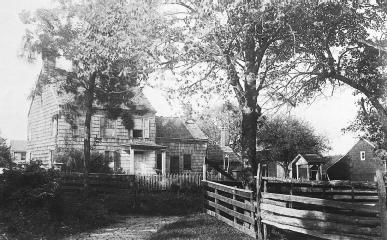
Figure 1. The farmhouse at West Hills, near Huntington, Long Island, New York, where Whitman was born on May 31, 1819. It was built by his father, a skilled carpenter. Library of Congress.
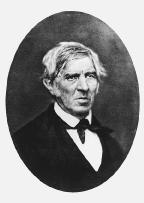
Figure 2. Walter Whitman, the poet's father. He died in July 1855, the month in which the first edition of Leaves of Grass was published. The photograph probably antedates 1852, when Walter Senior was stricken with a wasting illness. Library of Congress.
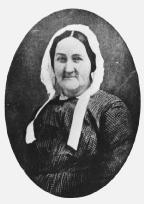
Figure 3. Louisa Van Velsor Whitman, the poet's mother, in 1855. Walt idealized her and persuaded his friends to do the same. Library of Congress.
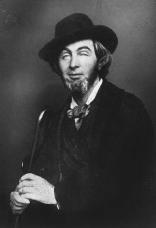
Figure 4. The earliest known photograph shows Whitman the dandyish man about town. Early 1840s. He created a vivid impression, and William Cauldwell, a printer who worked in the building at 142 Nassau Street that housed the New York Aurora, a newspaper Whitman was editing, had no trouble recalling sixty years later that “he usually wore a frock coat and a high hat, carried a small cane, and the lapel on his coat was almost invariably ornamented with a boutonniere.” Ed Folsom Collection.
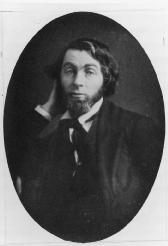
Figure 5. Whitman the journalist in New Orleans, in 1848. He and his younger brother Jeff stayed only four months and were homesick, but Whitman used this experience to link erotic and racial themes in his emerging free-verse poems. Ed Folsom Collection.
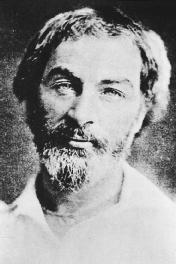
Figure 6. Whitman in 1854, when he was writing the first edition of Leaves of Grass. His Canadian psychiatrist friend, Dr. Richard Maurice Bucke, later called this photograph “the Christ likeness.” Ed Folsom Collection.
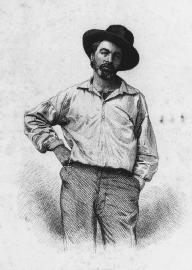
Figure 7. The studiously insolent frontispiece for the 1855 Leaves of Grass, engraved by Samuel Hollyer after a daguerreotype made by Gabriel Harrison. In the eyes of many, there is a red flannel undershirt showing, and the hand-on-hip, hand-in-pocket pose contributes to the unconventional author's seductive allure. Charles E. Feinberg Collection.
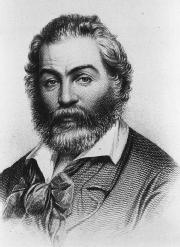
Figure 8. The formal frontispiece for the 1860 Leaves of Grass. Steel engraving from an 1859 painting by Charles Hine. Dressed up and looking thoughtful but constrained, Whitman was seeking to dispel the “rough,” “queer person” image he had begun to inspire. Charles E. Feinberg Collection.
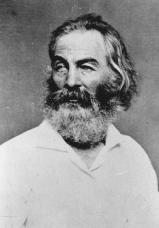
Figure 9. The compassionate Whitman during the Civil War, in about 1862. A friend thought he looked sorry for the world. Photographed by Mathew Brady in New York. Ed Folsom Collection.
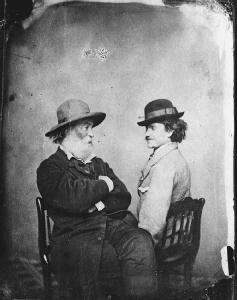
Figure 10. Whitman and his loving comrade Peter Doyle, an Irish immigrant and former Confederate soldier, in Washington, D.C., about 1869. They met on a streetcar Pete was driving, probably in the winter of 1865–66. The charming but uneducated workingman was uncomfortable with Whitman's intellectual friends and vice versa. Charles E. Feinberg Collection.
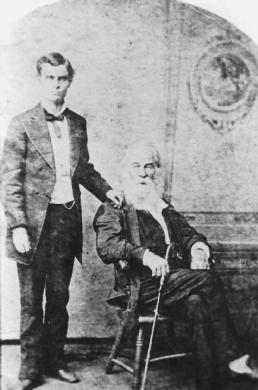
Figure 11. Whitman and his tempestuous “darling,” Harry Stafford, a New Jersey farm boy, in the late 1870s. Whitman helped him to find employment, as he had apparently done for Fred Vaughan in the 1850s. There is no known photograph of Fred, a Broadway stagecoach driver who probably inspired some of the Calamus poems. During the flourish-years of his romance with Harry, to whom he gave a ring, Whitman was recovering from the depression that had been plaguing him since January 1873, when he suffered a paralytic stroke from which he never fully recovered. In the photograph, the cane in his hand is no longer decorative. A boarder at the Stafford farm, the poet enjoyed nude bathing in Timber Creek, and Harry's mother, Susan Stafford, pleasantly reminded him of his own. Edward Carpenter Collection, Sheffield (England) Archives.
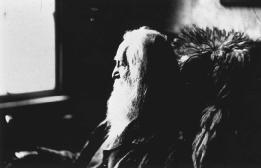
Figure 12. Whitman in May 1891, the last year of his life, photographed by Samuel Murray. Library of Congress.
